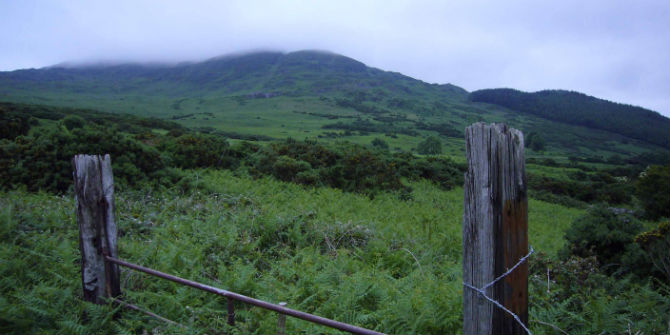 For 20 years, Northern Ireland was tucked out of sight of Westminster. But the combination of the row over the backstop, the DUP’s power-broking and two years without any government in Stormont have changed that. The hatred and revenge that flowed from British-Irish power struggles is child’s play to arouse and the work of thousands to manage, writes Duncan Morrow (Ulster University).
For 20 years, Northern Ireland was tucked out of sight of Westminster. But the combination of the row over the backstop, the DUP’s power-broking and two years without any government in Stormont have changed that. The hatred and revenge that flowed from British-Irish power struggles is child’s play to arouse and the work of thousands to manage, writes Duncan Morrow (Ulster University).
Empire could never be the same experience for those who saw glory in it and those who felt its fist. But it left an indelible mark on the lives of its children on all sides, and on their politics. For these last 20 years – when Northern Ireland was tucked in a forgotten corner, out of the way of the main news – it hasn’t seemed necessary to notice that Ireland is not like England when it comes to history. Even when things weren’t going that well in Belfast, the Queen’s visit to Dublin erupted into an Irish national celebration. Shared language, modern Irish prosperity, easy personal interaction and the popularity of so many Irish people on British television assured the world of a new era of tranquillity, of ‘nothing to see’, of friendship, even. The upbeat message was that division was past tense, that peace had taken root and that any visible evidence of hostility was a dying remnant of something redundant – history.

But 20 years of calm made many forget how unusual peace was in the face of a legacy of killing and confrontation. Brexit has – first gradually and then suddenly – brought everyone interested in Ireland back, to realise that the absence of violence not the same as peace built on deep relationships. And though nobody is admitting that they brought us here deliberately, there is an unmistakable sense that we are back on a vaguely remembered track, when Irishness and Britishness were opposites not partners, and conflict in Northern Ireland was deep, unforgiving and intractable. All of a sudden, the air is full of hard borders and threats to peace, of English arrogance and Irish over-reach, of a United Ireland and threats to sovereignty and consent.
This time around, mutual loathing and polarisation have not come in explosive bursts of violence in Ulster, but like a slick of heavy crude oil from a leaky tanker. The first sign of a toxin seeped not from Brexit but from allegations that Arlene Foster, the First Minister, was part of a disastrous web of nepotism, mismanagement and graft around renewable heating.
Instead of relying on their republican partners to prevent unwanted scrutiny – a practice of mutual aid which protected numerous ministers from both sides in Stormont from resignation for some years – the DUP made increasingly frantic (and decreasingly constitutional) efforts to protect their leader. Breaking point came, however, when a Unionist minister apparently gratuitously insulted and denigrated the Irish language. Nationalist patience with Stormont and the Executive partnership snapped. In the sectarian Stormont 2017 election, where the DUP leader compared their republican partners to insatiable crocodiles, a surge in nationalist anger saw unionism lose its overall majority in Northern Ireland for the first time in a hundred years.
Few, however, foresaw the chain of events which culminated in the DUP holding the balance of power at Westminster just four months later. Although weakened in their local Assembly, the party was the swing vote in Parliament just as a weak Prime Minister negotiated with Brussels. Less noticed, but significantly, Conservative reliance on the DUP at Westminster was of such pivotal importance that it eclipsed any strategic partnership with Ireland on which the entire Northern Ireland peace process stands or falls.
As they now lacked anything approaching impartial arbitration, talks to establish a new Northern Ireland stalled and finally crashed over the Irish language. For more than 740 days now Northern Ireland has had no Executive. Despite real distress in every area of public policy, all efforts to re-establish government have come to a complete halt. It is not just that there is no government, it is that nobody of any influence any longer seemed to care about Stormont or Northern Ireland, except as a pawn in a game of geopolitical chess.
Meanwhile the contradictions between a vote for stricter border control with the EU across the UK, and the requirements for an exceptionally open border in Ireland, have become inexorably clear. On the surface, there has been no panic. But anyone digging beneath the despair of internal political stasis can quickly detect an unmistakable rise in dread. The pillars on which the fragile peace edifice was built – British-Irish relations, partnership governance and a commitment to reconciliation, however far off – are all being shaken on a daily basis. And as the reverberations spread, so ‘what was’ is gradually disappearing from view, while violent men (most of them are men) lurk in the shadows, looking for opportunities.
Only this weekend, unremarked in the UK media, 2000 Irish nationalists from every profession and party and place gathered in Belfast to ‘Think 32’ (Counties) about Ireland’s future beyond Brexit. In the words of one local journalist, Irish nationalism is ’so over’ Northern Ireland. And it seems increasingly clear that they will be in no mood to find their way back any time soon. In a widely covered photo-op, Sinn Fein leaders knocked polystyrene bricks from an replica Berlin Wall on the border. Meanwhile the walls within Northern Ireland inched higher, even if nobody seemed to think that worthy of attention.
But while nationalism walks away in disgust, Unionism digs in for a new front, still insisting on a hard border and no special deals. Leo Varadkar and Simon Coveney, the least flag-waving Irish leadership team since the foundation of the Irish state, are vilified daily in the London Brexit press. In Westminster, Conservative and DUP politicians make increasingly frantic efforts to ‘stop the open border backstop’ on which the Withdrawal Agreement is founded, apparently indifferent to the increasingly desperate warnings from anyone who knows anything about the unworkable logic being set in train.
When Tony Blair framed the 1998 Agreement as ‘the hand of history’, he faced ridicule and embarrassment. But he was right. Some days and some decisions in politics have hundred-year consequences. Ireland is not like England – in part because it has lived with the consequences of violence more consciously. Everyone knows that the hatred and revenge that flowed from British-Irish power struggles is child’s play to arouse and justify and the work of thousands to manage and marginalise, let alone extinguish. Unavoidably, the decisions around Brexit are being taken in this context. With less than two months to go, the hand is moving again.
This post represents the views of the author and not those of the Brexit blog, nor the LSE.







The general election of June 2017 seems to me to be where all the problems started.
People forget that the Conservatives are a MINORITY government. They can only maintain a majority in the Commons with the support of DUP votes. This is the most horrendous alliance possible. It is similar to a Corbyn government being kept in power with the support of Sinn Fein votes.
It is the combination of the two extremes, of the European Research Group in the Tory Party and the DUP, which is leading the UK to the disaster of a “no deal” Brexit. I personally believe the backstop is only a cover: they both secretly are working for a “no deal” Brexit.
Some way needs to be found to stop these fundamentalists. Moderate Tories need to act, and act fast. They are being strung along by the ERG and the DUP.
A very well structured article by Duncan Morrow and I agree with your conclusion Friedrich that the goal of DUP ERG would indeed seem to be a no deal Brexit.
Some excellent work came at an earlier point in the debate from Dublin based IIEA with ex UK Ambassador Daitni O Ceallaig leading the effort. The Dublin London dialogue remains critical to the process at all levels. There is a need for engagement now to mitigate the worst outcome and effects